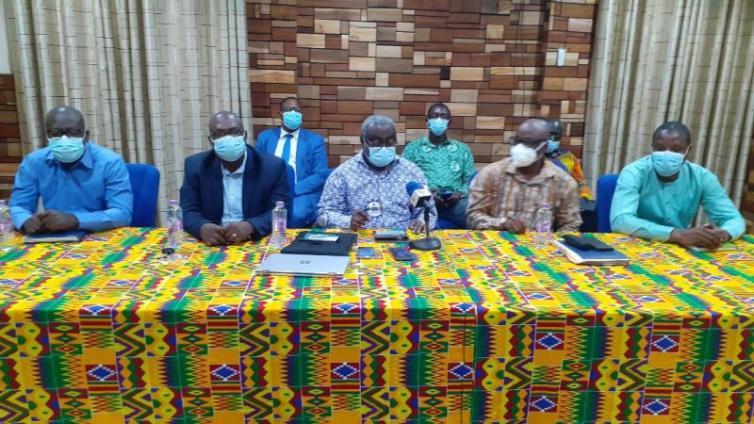The Teachers and Educational Workers Union (TEWU) has given a two-week ultimatum to the government to address concerns relating to the Union's condition of service to aid teaching and learning in the Public Universities.
The Union is calling on the government to respond promptly to the concerns of TEWU in the Public Universities to avoid any further disruption of academic work on the campuses.
Mr. Mark Denkyira Korankye, the General Secretary of TEWU on Tuesday in a press briefing in Accra, expressed concerns about the way the Union has been neglected over their condition of service for over two years.
"Since January when we embarked on our industrial action, the National Labour Commission invited us and the other negotiating parties and charged us to go back and re-enter negotiations."
"However, on February 4, 2022, we re-entered negotiation on two major items, which are the non-basic allowance and the exposure to eminent hazard allowance", he said.
He said after going through series of meetings, the government team continued to maintain their stance of offering eight per cent on its non-basic allowance, which was earlier offered by the Chief of Staff in January, 2021, but the Union stated that the rate was not in sync with the tenet of negotiation.
On the advice of the Minister for Employment and Labour Relations, he said, a Technical Committee was set up to look at various options and make recommendations to the Minister on the way forward on the issue.
The General Secretary said the Committee completed the assignment and recommended between 10 to 15 per cent increment on the Union's non-basic allowance but government's delay in implementing the recommendations is causing more harm than good to its members.
"Despite our resolve to pursue constructive engagement with all stakeholders in addressing our concerns, the posture of feet dragging by government agencies, tend to point to the obvious consequence of labour unrest," he said.
He said the Union had on several occasions objected to the situation where stakeholders always think the issues of the non-teaching staff were secondary when there were discussions on policies, conditions of service and other interventions at the educational sector.
The impression, he stated was created as though only the teacher group was critical in ensuring conducive teaching and learning environment.
Latest Stories
-
Man Utd striker Hojlund available for £30m
7 minutes -
Ukraine hits oil depot and Russia strikes homes near Black Sea
11 minutes -
Suspect arrested with arms and ammunition in joint police-military operation in Nkwanta
13 minutes -
Over 3500 students affected by unaccredited tertiary institutions – PUSAG
43 minutes -
PUSAG backs GTEC’s crackdown on unaccredited tertiary institutions
1 hour -
Media courts needed to protect journalists in Ghana – Law lecturer
2 hours -
MPOX cases surge: 20 new infections push total to 302
4 hours -
Police foil robbery attempt on Tutuka-Akrofuom road
6 hours -
Police refute alleged raid of Bono East NPP chairman’s house
7 hours -
Thousands storm Independence Square for emotional vigil to honour Daddy Lumba
7 hours -
31 business leaders receive honours at Ghana Entrepreneurs Foundation’s 15th anniversary
8 hours -
Ghana Gas CEO raises alarm over galamsey threat to national pipeline
9 hours -
Kusaas Diaspora Union demands state protection for Garu MP over death threats
9 hours -
African Paralympic Committee President concludes Nigeria visit ahead of Games
10 hours -
NSMQ 2025: Achimota School dethrones Presec to win Greater Accra championship title
10 hours

